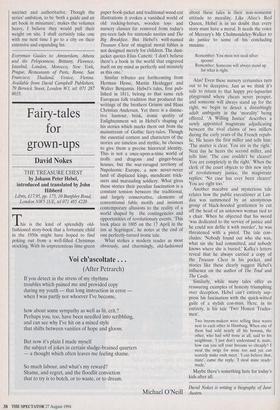Fairy-tales for grown-ups
David Nokes
THE TREASURE CHEST by Johann Peter Hebel, introduced and translated by John Hibberd Libris, £17.95, pp. 175, 10 Burghley Road, London NW5 1 UE, tel 071 485 4220 This is the kind of splendidly old- fashioned story-book that a fortunate child in the 1950s might have hoped to find poking out from a well-filled Christmas stocking. With its unpretentious lime-green
paper book-jacket and traditional wood-cut illustrations it evokes a vanished world of old rocking-horses, wooden toys and nursery classics far removed from today's pre-teen fads for nintendo nasties and The Big Breakfast. But Hebel's well-named Treasure Chest of magical moral fables is not designed merely for children. The dust- jacket quotes Elias Canetti: 'I don't believe there's a book in the world that engraved itself on my mind as perfectly and minutely as this one.'
Similar tributes are forthcoming from Herman Hesse, Martin Heidegger and Walter Benjamin. Hebel's tales, first pub- lished in 1811, belong to that same rich European folk tradition that produced the writings of the brothers Grimm and Hans Christian Andersen. Yet there is a distinc- tive humour, brisk, ironic quality of Enlightenment wit in Hebel's shaping of his stories which marks them out from the mainstream of Gothic fairy-tales. Though the essential content and characters of the stories are timeless and mythic, he chooses to give them a precise historical identity. This is not a once-upon-a-time world of trolls and dragons and ginger-bread houses, but the war-ravaged territory of Napoleonic Europe, a new never-never land of displaced kings, mendicant trick- sters and marauding soldiery. What gives these stories their peculiar fascination is a constant tension between the traditional, and largely conservative, elements of conventional fable motifs and insistent contemporary allusions to the reality of a world shaped by the contingencies and opportunities of revolutionary events. 'This took place in 1805 on the 17 April in the inn at Segringen', he notes at the end of one perfectly-turned ironic tale.
What strikes a modern reader as most obviously, and charmingly, old-fashioned about these tales is their non-nonsense attitude to morality. Like Alice's Red Queen, Hebel is in no doubt that every story must have a moral. It needs the voice of Mercury's Mr Cholmondeley-Walker to do justice to some of his concluding maxims:
Remember: You must not steal silver spoons!
Remember: Someone will always stand up for what is right.
Alas! Even these nursery certainties turn out to be deceptive. Just as we think it's safe to return to that happy pre-lapsarian playground where cheats never prosper, and someone will always stand up for the right, we begin to detect a disturbingly adult ambiguity in the 'morality' being offered. 'A Willing Justice' describes a newly appointed magistrate adjudicating between the rival claims of two millers during the early years of the French repub- lic. He hears the first miller and tells him: `The matter is clear. You are in the right.' Next day he hears the second miller, and tells him: The case couldn't be clearer! You are completely in the right.' When the clerk of the court objects to this new style of revolutionary justice, the magistrate replies: 'No case has ever been clearer! You are right too.'
Another macabre and mysterious tale relates how the public executioner at Lan- dau was summoned by an anonymous group of black-hooded gentlemen to cut off the head of an unknown woman tied to a chair. When he objected that his sword `was dedicated to the service of justice and he could not defile it with murder', he was threatened with a pistol. The tale con- cludes: 'Nobody found out who she was, what sin she had committed, and nobody knows where she is buried.' Kafka's letters reveal that he always carried a copy of the Treasure Chest in his pocket, and stories like these clearly suggest Hebel's influence on the author of The Trial and The Castle.
Similarly, while many tales offer us reassuring examples of honesty triumphing over deception, Hebel can't entirely sup- press his fascination with the quick-witted guile of a stylish con-man. Here, in its entirety, is his tale 'Two Honest Trades- men'.
Two broom-makers were selling their wares next to each other in Hamburg. When one of them had sold nearly all his brooms, the other, who had sold none at all, said to his neighbour, 'I just don't understand it, mate, how can you sell your brooms so cheaply? I steal the twigs for mine too and yet can scarcely make ends meet.' I can believe that, mate', came the reply. '1 steal mine ready- made.'
Maybe there's something here for today's kids after all.
David Nokes is writing a biography of Jane Michael O'Neill Austen.


























































 Previous page
Previous page